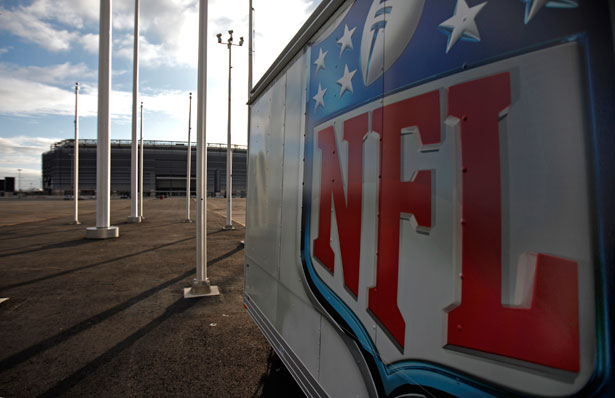 The NFL logo a trailer near the New Meadowlands Stadium. (Reuters/Mike Segar)
The NFL logo a trailer near the New Meadowlands Stadium. (Reuters/Mike Segar)
The opening Thursday night game of the NFL season is usually heavy on the pomp, light on the circumstance. Teams, especially in an era of high player turnover, are trying to gel on the fly. Miscues abound, and only very rarely is what we see on the field in early September actually a prologue for the season to come. In other words, after last night’s 49-27 thrashing, we can say with near certainty that the Denver Broncos are not nearly as good as they seemed and the Ravens are not nearly as bad. And yet, there were more than a few moments from the game that we can expect to echo throughout the season.
Underlying every echo was the NFL’s highly selective approach to player safety. The league squashed the 4,500-former-player class action concussion lawsuit last week, ensuring that any of their classified neurological research on the ill effects of playing football would stay under lock and key. Then the season started with the first of weekly Thursday-night games, a practice that gives players less than a week to recover from injuries and has been cited repeatedly as an example of the league’s putting profits ahead of players. And to top it off, in a dramatic bit of irony, last night the game was delayed for more than thirty minutes because of fear that lightning storms would put players at risk. This launched a cacophony of observations that NFL Commissioner Roger Goodell cares more about the effects of lightning on players than traumatic brain injury. I thought about armchair war-monger Max Boot’s Wall Street Journal column about how we are all a bunch of ninnies for caring about player safety and in fact “simply being outside produces more deaths than playing football. In 2012, twenty-eight Americans died in lightning strikes.” (Boot has been accused of plagiarizing someone else’s “in defense of football” article. For what it is worth. I don’t think he plagiarized it. I just think the argument itself is so trite it ensures repetition).
Another aspect of last night we can expect to act as prologue for the season to come were Broncos quarterback Peyton Manning’s utterly ridiculous numbers. The future Hall of Famer threw for seven touchdowns. Yes, seven. This is the first time a QB has tossed seven since the Minnesota Vikings Joe Kapp did it in 1969. Even more outlandish, Manning threw for 302 yards and five touchdowns in the second half. Here are some quarterbacks who never threw for 300 yards and five touchdowns in an entire game: John Elway, Terry Bradshaw, Bart Starr, Roger Staubach. It was an unreal performance, but before the season ends, it is going to seem a lot more ordinary. Yes, Peyton Manning is Peyton Manning, but the rules are now stacked in favor of offenses, making the playing of any kind of pass defense next to impossible. Being in an NFL secondary is now like playing goalie in soccer during a penalty shootout. If you guess correctly, you can stop a goal, but if the person with the ball executes, you are basically at their mercy. Roger Goodell will tell you that these rule changes are about player safety. Don’t believe him. As Sean Pamphilon shows in his new film The United States of Football, the kinds of head injuries that damage players are far more prevalent in the kinds of mundane everyday, every-play, sub-concussive hits. The “jacked up” hits can and should make us uncomfortable, but it’s not where the danger actually lies. Players themselves despise the large fines and constant penalties for playing physical defense, not (only) because they want to keep their money but because they feel it is window dressing to make the league look “tough” on player safety. Once again, if the league really cared about safety, it would end Thursday-night games. It would stop agitating for a longer season. The rule changes we have seen are far more about putting points on the board, putting butts in the seats, and public relations. By the end of this season, I would put strong money on a half-dozen quarterbacks’ having games where they throw six or more touchdowns. I hope people have a taste for arena-league football, because that is what is coming.
The last part of the opening game of the season that we can expect to replicate itself throughout the season are the announcers’ discomfort with what is a cultural sea-change in how we view and understand football injuries. This was seen sharply when Al Michaels and Cris Collinsworth spoke about Broncos defensive end Derek Wolfe. The second-year player was wheeled off the field during an August pre-season game against the Seattle Seahawks after a “concussion of the spinal chord”, once again after typical, not dramatic, contact. There were questions about whether he might have suffered a paralysis. Instead, he was back on the field last night, ready to play. Michaels and Collinsworth called this “miraculous” but instead of decking Wolfe with garlands of tough-guy machismo, they actually seemed uneasy and spoke instead of the “risks of the game” in more hushed tones. How announcers navigate the fact that we are watching an entertainment that is unsafe at any speed will be something to chart throughout the season. As much as the NFL has tried to keep the dangers in the closet, it is now part of the narrative of a sport that, bells and whistles aside, has probably began a generational downturn. No amount of seven-touchdown games can obscure what is coming: a mass reassessment of how we view this most American of games.


